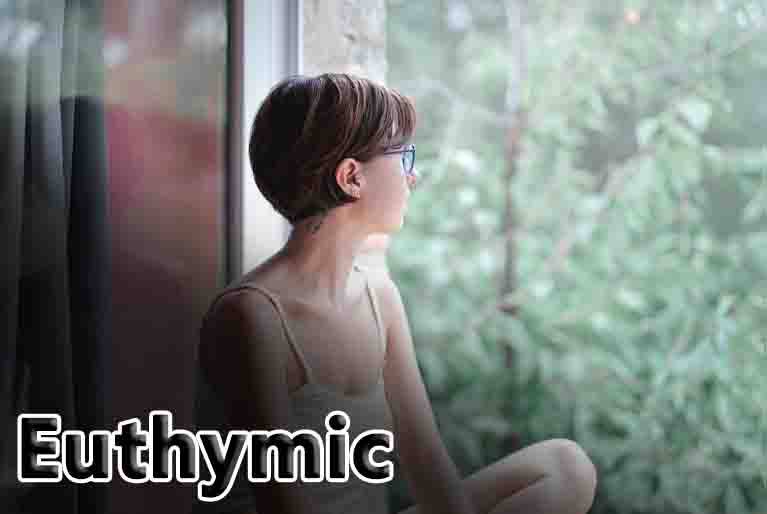Euthymic Definition
Euthymic is the state of being in euthymia, which is a relatively neutral mood that is neither extremely happy nor extremely sad. It comes from the Greek words eu, meaning good, and thymos, meaning spirit. It is usually used in the context of mental health, especially when referring to bipolar disorder, which is a mood disorder characterized by periods of depression and periods of mania (elevated mood).
History of Euthymia
The term euthymia has been used since the time of ancient Greek philosophers such as Democritus, who lived from about 460 to 370 BCE. Democritus considered euthymia to be similar to cheerfulness, but not pleasure; instead, it was a life lived calmly and steadily without fear or other negative strong emotions. He also regarded euthymia as a goal to be strived for in life.
Types of Mood
A mood is a long-lasting emotion that affects how a person views the world around them. Moods include anger, anxiety, depression, and elation, among many others. Euthymia is just one of several types of mood. Other types of mood include dysphoria and euphoria.
Dysphoria is an intense feeling of distress and unease that accompanies anxiety and depression. Individuals experiencing dysphoria are said to be dysphoric. Euphoria, on the other hand, is a feeling of intense happiness and well-being.
An individual experiencing euphoria is called euphoric. Moods can also be depressed or elevated, which refers to emotions that are not as strong as dysphoria or euphoria, but are not euthymic either.
A person who is euthymic has neither an elevated nor depressed mood. In some cases, this refers to contentedness; however, it can also just mean that a person is not feeling any strong emotion at the moment. It can even refer to anhedonia, which occurs when a person does not feel pleasurable emotions, and which is sometimes associated with boredom or even depression.
Bipolar Disorder
Bipolar disorder is a mood disorder that affects about 3 percent of the US population and about equal numbers of females and males. People with this disorder go through marked periods of depressed and elevated mood. There are two types of bipolar disorder: bipolar I and bipolar II.
People with both of these types experience depressive episodes. These are periods lasting for days or weeks that may include feelings of sadness, irritability, hopelessness, self-loathing, and suicidal thoughts. People with bipolar I also have manic episodes, which are the opposite of depressive episodes. Manic episodes may include feelings of elevated or irritable mood along with rapid speaking, racing thoughts, inability to concentrate, and impulsive behaviors.
People with bipolar II do not have manic episodes, but they do have hypomanic episodes, which are less severe than mania. Some people experience increased creativity during hypomanic episodes, while others become more irritable. A person with bipolar disorder may also have a mixed episode, where they experience some symptoms of mania and depression at the same time.
In both bipolar I and II, euthymia is regarded as a “normal” state, one in which a person is not undergoing a depressive or manic (or hypomanic) episode. Euthymia is the goal of treating bipolar disorder. Treatment is available in the form of mood stabilizing medicines and psychotherapy.
Another form of treatment involves making lifestyle changes such as getting enough sleep, reducing stress, becoming self-aware through actions such as making a mood chart, and treating substance abuse disorders, which often occur in conjunction with bipolar disorder.
Mental Status Examination
The Mental Status Examination or Mental State Examination (MSE) is a form of assessment by mental health professionals. Many aspects of a patient’s behavior are assessed, from their appearance, speech, and thoughts to their mood and affect.
Euthymic is one mood that may be recorded by a clinician during the MSE; other moods include dysphoric, euphoric, anxious, or apathetic, among others. Affect describes how a person’s mood is shown through nonverbal behavior, and it also described by whether it is appropriate for the situation.
Different individuals may be euthymic with different types of affect. Congruent affect means that a person’s emotions are appropriate for the situation, while incongruent affect means that the emotions are not appropriate. Reactive affect means that a person’s affect changes appropriately depending on the subject of the conversation.
Blunted/flat affect means that a person’s affect does not change based on the situation, or they may show no response at all. Restricted affect is when a person’s feelings are restricted slightly and are not fully expressed.
Related Biology Terms
- Mood – A long-lasting emotional state that has an effect on a person’s worldview.
- Affect – A display of emotion, often through nonverbal actions such as facial expressions, gestures, and tone of voice.
- Dysphoric – The state of being in dysphoria, which is a feeling of discomfort, unease, and dissatisfaction that can go along with anxiety and depression.
- Euphoric – The state of being in euphoria, which is a feeling of intense well-being and happiness.

